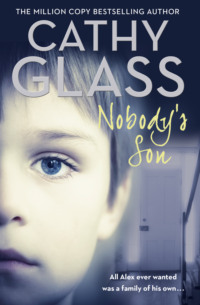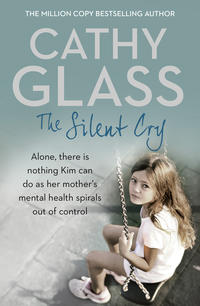
A Terrible Secret: Part 2 of 3


Copyright
Certain details in this story, including names, places and dates, have been changed to protect the family’s privacy.
HarperElement
An imprint of HarperCollinsPublishers
1 London Bridge Street
London SE1 9GF
www.harpercollins.co.uk
First published by HarperElement 2020
FIRST EDITION
© Cathy Glass 2020
Cover layout design © HarperCollinsPublishers 2020
Cover photograph © Tanya Gramatikova/Trevillion Images (photograph posed by a model)
A catalogue record of this book is available from the British Library
Cathy Glass asserts the moral right to be identified as the author of this work
All rights reserved under International and Pan-American Copyright Conventions. By payment of the required fees, you have been granted the nonexclusive, non-transferable right to access and read the text of this e-book on screen. No part of this text may be reproduced, transmitted, downloaded, decompiled, reverse engineered, or stored in or introduced into any information storage retrieval system, in any form or by any means, whether electronic or mechanical, now known or hereinafter invented, without the express written permission of HarperCollins e-books.
Find out about HarperCollins and the environment at
www.harpercollins.co.uk/green
Source ISBN: 9780008398743
Ebook Edition © September 2020 ISBN: 9780008405298
Version: 2020-09-30
Contents
1 Cover
2 Title Page
3 Copyright
4 Contents
5 Chapter Ten: A Shock
6 Chapter Eleven: Grandmother
7 Chapter Twelve: The Visit
8 Chapter Thirteen: ‘I Can’t Believe It!’
9 Chapter Fourteen: Revenge
10 Chapter Fifteen: ‘What a Dreadful World we Live In’
11 Chapter Sixteen: Accused
12 Chapter Seventeen: ‘You’ll Hate Me’
13 Chapter Eighteen: The Photograph
14 Moving Memoirs
15 About the Publisher
LandmarksCoverFrontmatter
List of Pagesvvi979899100101102103104105106107108109110111112113114115116117118119120121122123124125126127128129130131132133134135136137138139140141142143144145146147148149150151152153154155156157158159160161162163164165166167168169170171172173174175176177178179180181182183184185186187188189190191192193
Chapter Ten
A Shock
We got to the phone shop in time and converted Tilly’s phone to a pay as you go. It needed a new SIM card, which came with a different number. Had she wanted to keep the same number, it would have required an authorization code that the assistant told us could take twenty-four hours. Not wanting to be without her phone, Tilly opted for having the new number. This, of course, had the advantage that Dave didn’t know it. I paid and we left the shop with Tilly happily texting her friends.
It was too late for Tilly to call her mother as she usually did on the days she didn’t see her. Dave was likely to be home by now, so Tilly said she’d give her mother the new number when she saw her tomorrow.
‘Make sure she knows Dave mustn’t have it,’ I said. ‘And put your phone on “private number” when you call her so it doesn’t show on their phone bill.’
‘I will.’
Once home, I made dinner and then sat with Tilly and went through the schoolwork that she’d fallen behind with, prioritizing what needed to be done first, both on her laptop and in her exercise books. As well as unfinished work from previous weeks, there was also current homework. Clearly Tilly couldn’t be expected to catch up in a few days, so I suggested that rather than get further behind, she completed the current work first and then spent some time each evening catching up. It would show the school she was making an effort and was sincere in her wish to do better. I also suggested that in future she did some homework when she first arrived home, before dinner, and then another two hours after dinner, stopping for a break halfway through, which is what my children had done when they were studying. Tilly pointed out straight away that it wasn’t going to work on Monday, Wednesday and Friday when she saw her mother.
‘OK, so use the time on the bus to research and plan your work, then you can write it up when you return. You’re usually back here by five-thirty, so plenty of time.’
‘I’ll need time to talk to Abby as well,’ she sighed, a bit disgruntled.
‘Of course, and to see her sometimes. Abby is doing well at school so I’m sure she’ll appreciate that you need to catch up. I expect she spends quite a bit of time studying in the evening too.’
‘Yes, and at weekends,’ Tilly admitted.
‘So when you are both free she could visit us again and maybe stay overnight? Half-term holiday isn’t far away.’
‘I’ll ask her.’
It is important for children in care that they live as normal a life as possible, although there are obstacles in their way that the average child doesn’t face. Meetings, for example, reviews and PEPs, visits from their social worker, not to mention contact, which can be very disruptive. It is vital that schools are aware of this and make allowances where necessary. Sometimes there is the feeling among teachers that once the child is in care all their problems vanish. But for many it’s just the beginning of a very long journey of adjustment, missing loved ones and coming to terms with a difficult past and uncertain future.
That evening Tilly worked until nine o’clock and then came downstairs for a drink before going to bed. ‘Can we arrange to see my gran soon as well?’ she asked me.
‘Yes, of course, we’ll need to phone her first to find out when is convenient. Can you give me her contact details? I don’t have them.’
A few minutes later Tilly reappeared and handed me a piece of paper with her grandmother’s address and phone number on it. I was taken aback when I read where she lived. ‘Your gran only lives a few miles away,’ I said. ‘When was the last time you saw her?’
‘Two years ago.’
‘And your mother hasn’t seen her since then either?’
‘No. Dave wouldn’t take her.’
‘And she couldn’t go on the bus or use a taxi?’
‘Not without him.’
‘But you’ve spoken to your gran on the phone?’ I asked.
‘Yes, a few times last year, but not for about six months.’
‘Oh dear.’
When I thought of all the times my family and I saw my mother and telephoned her in between, I struggled to appreciate why Heather hadn’t found a way to see her mother or at least speak to her on the phone. But then I wasn’t a victim of intimidation and control by an abusive partner as she was.
‘It’s a bit late to phone your gran now,’ I said. ‘We’ll call her tomorrow when you get back. Or you could phone from your mother’s, then she can talk to her as well,’ I suggested.
‘Mum won’t in case Dave finds out.’
‘He won’t know if you use your phone rather than the landline. There’s no tracker on your phone now and it’s a new SIM, so he has no control over it.’
Tilly’s face lost some of its seriousness as she realized the truth in what I was saying.
‘You’re a genius!’ she said, and kissed my cheek. ‘Mum can speak to whoever she likes on my phone and he won’t know.’
‘That’s right, but make sure she knows not to divulge the number to Dave,’ I reminded her.
‘I will.’
‘It might come as a shock to your gran to suddenly hear from you both after all this time and to learn you’re in care,’ I cautioned. ‘She may be upset to begin with.’
‘I’ll explain what’s happened. When shall I tell her we will be going to see her?’
‘This Sunday if that suits her.’
The following morning Tilly was happier than I’d seen her in a while. She looked as though a huge weight had been lifted from her shoulders, which it had. She was safely away from Dave, catching up on schoolwork and was going to see her gran and invite Abby back for another sleepover. Tilly hadn’t been with me a month, yet already I was seeing a difference. It was at times like this I knew why I fostered. Before she left for school, I gave her a front door key.
‘Thank you,’ she said. ‘Dave would never let me have one in case I lost it.’
‘You’re responsible enough to keep it safe,’ I said. ‘I trust you.’
Isa telephoned later that day to let me know the date and time of the PEP meeting the following week and I wrote it in my diary. I told her about the new SIM in Tilly’s phone and gave her the number. I said Tilly was planning on calling her gran from her mother’s house that afternoon to arrange a visit. Isa didn’t have Mrs Watkins’s contact details so I gave them to her. It was important that, as Tilly’s social worker, she had the contact details of those in Tilly’s extended family who she was seeing.
I thought about Tilly that afternoon and wondered how she was getting on as she phoned her gran. I imagined it would be a shock for Mrs Watkins to suddenly hear from her daughter and granddaughter after so long, but I hoped it was a pleasant one. At 5.30, when Tilly arrived home, she let herself in with her front door key and I went into the hall to greet her. ‘How did it go?’ I asked her eagerly.
‘All right. Sunday is fine, but Gran’s not well. We didn’t speak for long. She started coughing and couldn’t get her breath.’
‘What’s the matter with her?’ I asked, concerned.
‘She said she’d tell us when she saw us.’ Which I didn’t like the sound of.
‘She feels well enough for us to visit on Sunday?’ I checked.
‘Yes. She was pleased. She said to arrive between one and two o’clock, as that would be best for her. Then she started coughing.’
‘I expect she’s picked up a winter virus,’ I said. ‘Lots of people have coughs and colds, even flu, at this time of year. Did your mother speak to her?’
‘A little. It was awkward. Mum didn’t know what to say and Gran asked her why she wasn’t coming to see her on Sunday. Mum lied and said Dave was ill. I think Gran knew she was lying because she said he couldn’t have been ill for over two years. Mum went quiet and didn’t say any more.’
‘I suppose it’s not possible for your mother to come with us on Sunday? If we collected her in the car and dropped her off after?’ I suggested.
‘No. Dave will be there. She wouldn’t dare.’
I didn’t say anything further on the matter. Tilly knew it wasn’t right that Heather couldn’t visit her own mother, even though she was ill, but there was nothing I could do about it. Tilly was pleased she’d made the call and was looking forward to seeing her grandmother. She’d had some other good news too. Miss Jenkins, the deputy head, had spoken to her and said she’d had some feedback from staff and was pleased with the improvements she’d already made in her attitude to her work, and to keep it up. I praised her, and then she went to get a drink, which she took to her room.
I updated my log notes. Not just about school, but the phone call to her gran and that Heather wouldn’t be visiting her mother on Sunday because Dave wouldn’t let her. It affected Tilly and there was no way of knowing where this could lead in the future. If ever evidence was required in court to show that Tilly shouldn’t return home to live then details like this could form part of the case. My log had been used in care cases before, so I knew how important it was to keep accurate, detailed and objective notes, using the child or young person’s words as much as possible.
I’d just finished writing when Lucy came home, looking very pale.
‘The morning sickness is getting worse,’ she said. ‘I’ve been sick three times today and still feel sick. The smell of coffee in the staffroom made me retch.’
I sympathized. ‘Lots of women seem to have an aversion to coffee when pregnant. Have a lie-down before dinner.’
‘I don’t want any dinner,’ she said, pulling a face. ‘I can smell fish.’
‘I’m making fish pie, but you don’t have to have that. What do you fancy?’
She thought for a moment. ‘Cheese on crackers, and a glass of water. But I’ll have it in my bedroom so I don’t have to watch everyone else eat.’
‘OK, love.’ I gave her a hug. ‘It will pass.’
I made Lucy the cheese on crackers and took it up to her room with a glass of water and then finished making our dinner. Lucy was asleep by eight-thirty and the following morning I heard her dry-retching in the bathroom as soon as she got up. Then she bravely went to work. Like most women who suffer from sickness in pregnancy, Lucy carried on as best she could while feeling completely awful. If the sickness didn’t pass or got significantly worse, she’d need to see a doctor for a check-up to make sure she wasn’t getting dehydrated, which would be bad for her and the baby.
On Saturday I went to see my mother. Lucy stayed at home. She was going to rest in the morning and then see Darren in the afternoon. Adrian was going to see Kirsty. Paula and Tilly did some homework before we set off in the car. I think having the examples of Abby and Paula studying helped Tilly focus, although I’d never underestimate the struggle she faced trying to concentrate on schoolwork with her homelife in turmoil.
Mum welcomed us with hugs and kisses, and it wasn’t long before Tilly told her she was going to see her grandmother the next day and that she hadn’t seen her for over two years. Mum knew better than to ask why.
‘I’m sure your grandmother will be overjoyed to see you,’ Mum said. ‘As you get older, spending time with your children and grandchildren becomes even more special.’ Bless her, I thought.
‘I’m going to start seeing my gran every week,’ Tilly said. ‘I couldn’t before because of him, but now I’m at Cathy’s I can go whenever I want.’
‘Good,’ Mum said, without asking who he was. ‘That will make your gran very happy, I’m sure.’
Although I was taking Tilly to see her grandmother this weekend as Isa had asked, it occurred to me that if Tilly began going every weekend it would be difficult for me to commit to that level of contact. I thought that, if all went well tomorrow, I’d suggest to Isa that some weeks Tilly could catch the bus to visit her gran. It was only a short journey, about the same as it was to Tilly’s school, just in a different direction.
As usual we had a lovely time at Mum’s. When we said goodbye she said to Tilly, ‘Don’t forget to tell your gran and your mother you love them. You may think they know, but it’s nice to hear it.’
‘Very true,’ I said as I kissed her.
We were a family who said ‘I love you’, but I knew many families didn’t, assuming they knew they were loved. I’m sure they do know, but it’s still nice to hear. ‘Bye, Mum. Love you,’ I said as we left.
The following day, after lunch, having reminded Adrian, Lucy and Paula where I was going, I set off with Tilly in the car to visit her grandmother. We stopped off on the way to buy some flowers and arrived at one-fifteen. Mrs Watkins lived in a bungalow in a street of similar properties, but unlike her neighbours, whose front gardens were neatly tended, her garden was mostly weeds. They had also grown up through the cracks in the path. ‘It didn’t used to look like this,’ Tilly said as we went to the front door. ‘Gran used to keep it nice.’
‘I expect it got too much for her,’ I said. Mrs Watkins was in her seventies and a widow.
Tilly pressed the doorbell and we heard it ring inside but it was a few minutes before the door opened. I knew straight away Tilly’s grandmother had more than a cold. She had the classic appearance of someone undergoing chemotherapy.
‘Gran, what’s the matter?’ Tilly asked, clearly shocked.
‘Don’t you worry about me,’ she said. ‘Lovely to see you both. Come in out of the cold.’
‘I’m Cathy, Tilly’s foster carer,’ I said, closing the door behind us.
‘I’m Nancy.’
Tilly’s grandmother used a walking stick and had lost large patches of her hair. Her face had that bloated look that can result from taking steroids – often given with chemo.
‘Sit yourselves down,’ she said, hobbling into her living room at the rear of the bungalow.
‘I bought these for you,’ Tilly said awkwardly, holding up the flowers as her gran eased herself into an armchair.
‘They’re lovely, dear. Thank you,’ she said breathlessly. ‘There’s a vase in the kitchen, in the cupboard below the sink. Could you put them in some water, please?’
‘Sure,’ Tilly said, and left the room, pleased to be occupied and of some help.
I met Nancy’s gaze. ‘How are you?’ I asked.
‘Not too wonderful,’ she said, lowering her voice. ‘I was diagnosed with lung cancer at the end of last year. They operated, took out half a lung, and now I’m on chemo. I wanted to explain to Tilly in person.’
‘Yes, I understand. I am sorry.’
‘I’m determined to fight this, but the chemo knocks the stuffing out of you.’
‘Yes. I have a friend who’s just been through similar, but it’ll be worth it in the end,’ I said positively.
‘Let’s hope so. It’s my own bloody fault for smoking. I stopped years ago but the damage must have been done.’
‘It’s not your fault,’ I said firmly. ‘Back then no one knew the dangers of smoking.’
She nodded and coughed.
‘You didn’t tell Heather you were ill?’ I asked.
‘No. She hadn’t been in touch for ages, so I thought it best not to worry her. She’s got enough problems of her own and our relationship is strained, to put it mildly.’
‘But you don’t mind her knowing now?’ I asked. ‘Tilly is bound to tell her.’
‘Yes, although I’m not sure what Heather can do apart from worry. She never leaves the house without him.’
‘You’re aware of the problems at home then?’ I asked carefully.
‘Some of it. I’ve surmised the rest.’ She coughed and cleared her throat again.
Tilly appeared, carrying the vase of flowers.
‘They’re beautiful. Thank you, love,’ Nancy said. ‘Can you make room for them over there on the sideboard?’ She pointed.
The glass-fronted sideboard, like the other furniture in the room, was of an older style but built to last with the wood polished and the glass gleaming. The three-piece floral suite – a sofa and two armchairs – was the same fabric as the curtains, and a rug was positioned in front of the hearth. The room was typical of an era and as you may find in the homes of many older people. The coal fire was no longer in use, having been replaced by central heating and an arrangement of dried flowers sat in the grate. Tilly set the vase on the sideboard and then joined me on the sofa. She looked at her gran, concerned.
‘I’ve had lung cancer, dear,’ Nancy told her. ‘But I’m getting better. I’ll have to get myself a wig if my hair doesn’t grow back. Perhaps blonde?’ she added with a smile.
‘But you are going to get better?’ Tilly asked, clearly worried.
‘Yes, of course. Don’t look so sad.’
‘But you never used to use a walking stick. Is that to do with the cancer?’
‘No. I tripped and fell and pulled a ligament in my ankle. They gave me the crutch at the hospital to use until it’s healed. Nothing for you to worry about. How are you and your mother?’
Tilly clearly didn’t know what to say for the best.
‘You can tell me,’ Nancy said. ‘I’ve been through a lot with your mother in the past.’ She coughed again.
‘Can I get you a drink?’ I offered.
‘Good idea. Let’s have a cup of tea,’ Nancy said. Then to Tilly, ‘I bought some of your favourite biscuits. Well, my neighbour, Babs, did. She’s been helping me with the shopping.’
‘Are they Jammie Dodgers?’ Tilly asked, referring to the popular round biscuits with jam in the middle.
‘Yes,’ her gran replied. ‘You can take home what you don’t eat. I’m not supposed to be having too much sweet stuff.’
I offered to make the tea, but Nancy insisted, so the three of us went into the kitchen. It was only when we returned to the living room with Tilly carrying the tray of tea and biscuits that the conversation turned serious.
‘Tilly, I might be getting old,’ her gran said, lowering herself into her armchair. ‘And I’m not in the best of health, but I’m not stupid. You need to tell me what’s been going on in your home. I haven’t seen you or your mother for over two years and then I find you’re in foster care.’
‘I’m sorry, Gran,’ Tilly said, her voice catching. ‘It’s been dreadful. I’m so pleased to see you.’ As she set the tray on the coffee table, a tear slipped from her eye.
Конец ознакомительного фрагмента.
Текст предоставлен ООО «ЛитРес».
Прочитайте эту книгу целиком, купив полную легальную версию на ЛитРес.
Безопасно оплатить книгу можно банковской картой Visa, MasterCard, Maestro, со счета мобильного телефона, с платежного терминала, в салоне МТС или Связной, через PayPal, WebMoney, Яндекс.Деньги, QIWI Кошелек, бонусными картами или другим удобным Вам способом.









